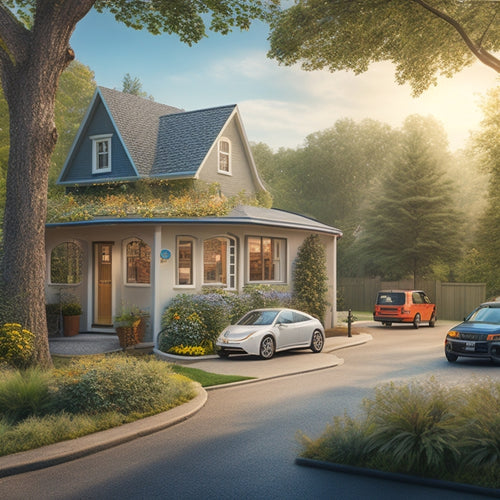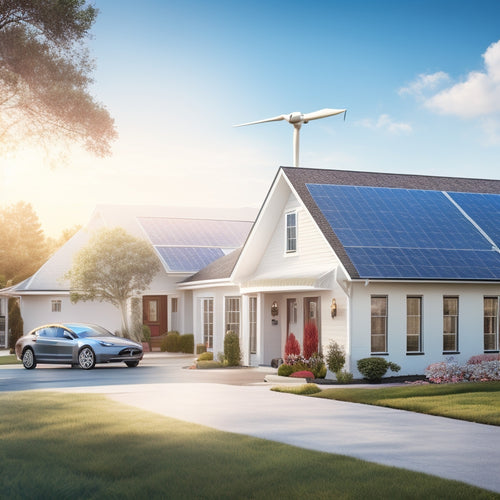
3 Best Ways to Finance Solar Panels for Homes
Share
You have three viable options to finance solar panels for your home, each catering to different financial situations and energy needs. You can opt for solar panel loans and credit, allowing you to borrow a lump sum to cover upfront costs. Alternatively, Power Purchase Agreements (PPAs) let you avoid upfront costs and buy electricity at a fixed rate. Solar panel leasing is another option, where you pay a monthly fee for panel usage. Each option has its pros and cons, and exploring them further can help you find the best fit for your energy goals and budget.
Key Takeaways
• Consider solar panel loans, which offer ownership and tax benefits, with zero-down financing options and lower interest rates using home equity.
• Explore Power Purchase Agreements (PPAs) to avoid upfront costs, purchase electricity at a fixed rate, and shield yourself from rising utility prices.
• Look into solar panel leasing options, which provide low upfront costs, maintenance handling, and upgrade or purchase options after the lease.
• Evaluate your financial situation and goals, researching available financing options and comparing terms, rates, and incentives before making a decision.
• Seek professional advice to get tailored guidance on the best financing option for your specific situation and needs.
Solar Panel Loans and Credit
You can explore solar panel loans and credit options, which allow you to finance your solar panel system through a lender or creditor that specializes in renewable energy projects. These lenders offer financing solutions tailored to the unique needs of homeowners looking to go solar.
With solar panel loans, you can borrow a lump sum to cover the upfront cost of the system, and repay it over time with interest. Some lenders even offer zero-down financing options, making it more accessible to homeowners.
You can also tap into your home equity to secure a loan, which can provide a lower interest rate and more favorable terms. Plus, don't forget to factor in government incentives, such as the federal solar investment tax credit, which can help offset the cost of your solar panel system.
Power Purchase Agreements
If you're not interested in owning a solar panel system outright, a power purchase agreement (PPA) can provide an attractive alternative, allowing you to harness the benefits of solar energy without shouldering the upfront costs.
With a PPA, a third-party provider installs and maintains the solar panel system on your property, and you agree to purchase the electricity it generates at a fixed rate, typically lower than your current utility rate. This setup can lead to significant energy savings, and you'll enjoy the benefits of clean energy without the hefty upfront investment.
The PPA provider is responsible for maintenance and repairs, so you won't have to worry about system downtime or equipment failures. Plus, you'll lock in a fixed rate for the electricity generated, shielding you from rising utility prices.
With a PPA, you can start reaping the rewards of solar energy without breaking the bank – a win-win for your wallet and the environment!
Solar Panel Leasing Options
Solar panel leasing options have gained popularity as a financing alternative, allowing homeowners to adopt clean energy solutions without significant upfront expenditures. With a lease, you'll pay a monthly fee to use the solar panels, and the leasing company will handle maintenance and repairs. This option is ideal for those who want to switch to solar energy without breaking the bank.
Here's a breakdown of what you can expect from solar panel leasing options:
| Feature | Details |
| Lease duration | 10-20 years |
| Insurance coverage | Typically included in lease agreement |
| Maintenance | Handled by leasing company |
| Upgrade options | May be available after lease duration |
| End-of-lease options | Return or purchase equipment |
Keep in mind that lease terms may vary depending on the provider and your location. Be sure to review the fine print and ask about any additional fees or requirements. With the right lease, you can enjoy the benefits of solar energy while keeping your upfront costs low.
Frequently Asked Questions
Can I Sell Excess Energy Generated Back to the Grid?
You can sell excess energy back to the grid, earning Grid Credits, which you can then use to offset your energy bills or even profit from Energy Trading, making you a clean energy entrepreneur!
Are Solar Panels Durable Enough to Withstand Harsh Weather?
You're wondering if solar panels can handle Mother Nature's tantrums? Rest assured, they're built to withstand harsh weather! Manufacturers subject them to rigorous climate testing to guarantee weather resistance, so you can enjoy clean energy, come rain or shine!
Do Solar Panels Increase My Home's Value and Selling Price?
You'll be thrilled to know that solar panels boost your home's value and selling price, thanks to appraisal benefits and enhanced property appeal, making your eco-friendly abode a hot commodity on the market!
Can I Install Solar Panels on a Rented Property?
"If you're renting, you'll need to check your rental agreements for any restrictions on modifications, and get your landlord's approval before installing solar panels - don't assume it's a done deal, buddy!"
Are Solar Panels Compatible With My Existing Roofing Material?
You're wondering if your existing roofing material is compatible with solar panels. Good question! Roof age plays a role, but most modern materials like asphalt shingles, metal, or clay tiles work well with solar panels, offering you various material options.
Related Posts
-

Why Nearby EV Conversion Shops Matter to You
Having a nearby EV conversion shop means you'll experience the benefits of a more personalized, convenient, and susta...
-

Top Online Stores for Solar Car Accessories
When searching online for solar car accessories, you'll find top retailers like Amazon, REI Co-op, and Best Buy offer...
-

Why Homeowners Are Embracing DIY Energy Independence
By taking control of your energy needs, you're breaking free from the uncertainty of utility bills and embracing a se...


